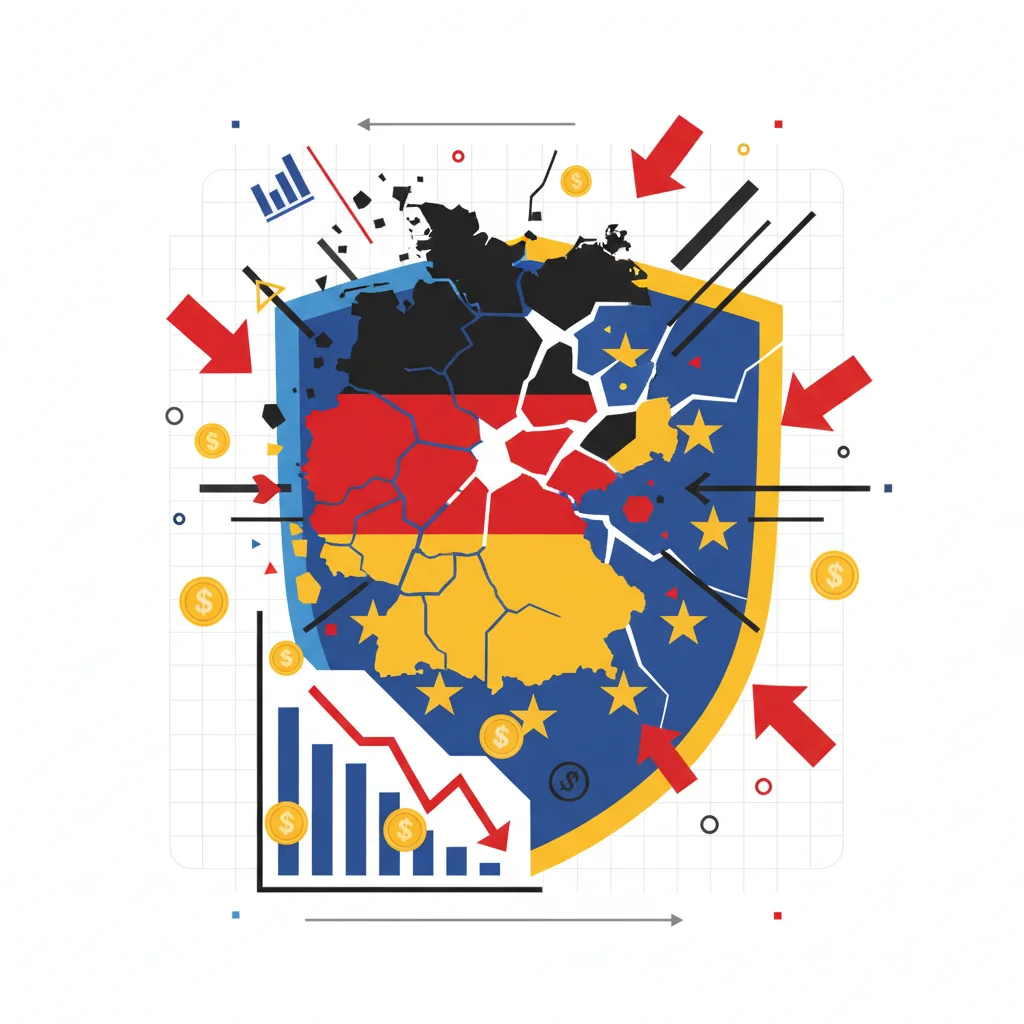
Germany’s Coalition Crisis: A Threat to Europe’s Security and a Red Flag for Investors
In the intricate world of global finance and investing, political stability is a cornerstone of market confidence. When the economic powerhouse of Europe, Germany, faces internal strife, investors, business leaders, and financial professionals take notice. A deepening rift within Germany’s ruling coalition over a plan to bolster its armed forces is not just a domestic political squabble; it’s a significant event with far-reaching implications for the European economy, NATO’s defense posture, and the trajectory of the global stock market, particularly within the defense sector.
At the heart of the issue is Germany’s “Zeitenwende,” or “turning point,” a landmark policy shift announced by Chancellor Olaf Scholz following Russia’s full-scale invasion of Ukraine. This new era promised a revitalized military, backed by a €100 billion special fund and a commitment to meet NATO’s 2% of GDP defense spending target. However, translating this financial commitment into tangible military strength is proving to be a monumental political challenge. The latest flashpoint: a proposal by Defence Minister Boris Pistorius to reintroduce a form of military service, which has been met with firm rejection from within his own Social Democrat (SPD) party (source). This deadlock imperils the plan to increase the Bundeswehr (German armed forces) from its current size to a target of 203,000 active soldiers, a number deemed essential for national and collective defense.
The Political Impasse and Its Economic Ripple Effects
Defence Minister Pistorius, a popular figure in Germany, has advocated for a new model of military service to address the Bundeswehr’s chronic personnel shortages. His proposal involves compelling all young men and women to complete a questionnaire about their attitudes towards military service. Based on these responses, a select group would be chosen via a lottery system for a period of service ranging from six to 12 months. The goal is to recruit an additional 5,000 to 7,000 soldiers annually.
However, influential figures within the SPD, the leading party in the “traffic light” coalition, have branded the plan as a form of compulsory service that contradicts the party’s platform. They argue that a professional, all-volunteer army is the modern solution. This ideological clash has created a political stalemate that sends a worrying signal about Germany’s ability to execute its ambitious “Zeitenwende” promises. For the financial community, this political paralysis translates directly into execution risk. A multi-billion-euro strategic initiative is stalled, casting doubt on the government’s stability and its capacity to manage the national economy through turbulent geopolitical times.
The table below outlines the core proposals and the current state of the German military, highlighting the gap between ambition and reality.
| Metric | Current Status | Proposed Goal | Key Challenge |
|---|---|---|---|
| Active Military Personnel | Approx. 181,000 | 203,000 by 2031 | Recruitment shortfall; political disagreement on service model |
| Proposed Recruitment Model | All-Volunteer Force | Lottery-based Selective Service | Rejected by key lawmakers within the ruling coalition (source) |
| Annual Recruitment Target (New Model) | N/A | 5,000 – 7,000 additional soldiers | Contingent on a political agreement that does not exist |
| NATO Spending Commitment | Meeting 2% of GDP target | Sustain 2% of GDP post-2028 | Special €100bn fund runs out; future funding uncertain |
This data illustrates a critical disconnect. The financial commitments have been made, but the human capital strategy—the most crucial component—is in disarray. This uncertainty can deter long-term investing in the German defense sector, as companies require stable, predictable government policy to justify capital expenditure on new production lines and R&D.
From “Peace Dividend” to Economic Burden: The New Financial Reality
For decades after the Cold War, Germany and much of Europe enjoyed a “peace dividend,” reallocating funds from defense to social programs and infrastructure. This era is definitively over. The “Zeitenwende” represents a seismic shift in public finance, forcing a re-evaluation of national budget priorities. The €100 billion special fund was a crucial first step, but it’s a temporary fix. The real test will come around 2028, when the fund is depleted, and an estimated €25-30 billion annual shortfall will need to be covered by the regular federal budget (source).
This looming fiscal cliff presents several challenging scenarios for the German economy:
- Higher Taxes: The government could raise taxes on corporations or individuals, potentially dampening economic growth and investor sentiment.
- Spending Cuts: Funds could be diverted from other sectors like social welfare, education, or climate initiatives, leading to significant domestic political backlash.
- Increased Debt: Berlin could choose to take on more debt, a move that would face strong opposition from fiscal conservatives and could impact Germany’s credit rating and borrowing costs.
The uncertainty surrounding this future funding model creates headwinds for the entire European economic bloc. Germany’s fiscal health is integral to the stability of the Eurozone’s banking system and overall market confidence. A prolonged and messy debate over the defense budget could spook markets and lead to increased volatility.
Modernizing Defense: A Hidden Opportunity for Financial Technology?
While the headlines focus on troop numbers, a critical subplot is the modernization of defense logistics and procurement—a domain ripe for technological disruption. Rebuilding a military force on this scale is a colossal exercise in project management, supply chain logistics, and, crucially, finance. The processes for managing multi-billion-euro contracts, ensuring transparent and efficient payment flows, and securing sensitive data are incredibly complex.
This is where the world of financial technology, or fintech, intersects with national security. Modern defense ministries are increasingly looking towards innovative solutions to manage these challenges:
- Procurement Platforms: Digital platforms that streamline the tender process, manage contracts, and automate payments to a vast network of suppliers, from large defense contractors to small, specialized tech firms.
- Supply Chain Finance: Fintech solutions can provide liquidity to smaller suppliers in the defense ecosystem, ensuring the entire supply chain remains robust and resilient.
- Blockchain for Transparency: For an area historically plagued by cost overruns and a lack of transparency, blockchain technology offers a compelling use case. A distributed ledger could create an immutable record of transactions, from contract award to equipment delivery, drastically reducing the potential for fraud and improving public trust in how taxpayer money is spent.
While Germany’s immediate challenge is political, the long-term project of rebuilding its military will necessitate a parallel investment in the digital and financial infrastructure that underpins it. This represents a nascent but potentially significant growth area for companies specializing in enterprise-level financial technology and secure transaction systems.
Conclusion: A Litmus Test for Germany and a Warning for Investors
The internal German debate over military service is a critical litmus test for the “Zeitenwende.” A failure to reach a compromise would not only undermine Germany’s own security but also weaken NATO’s eastern flank and send a message of disunity to its adversaries. For investors and business leaders, the stakes are equally high. The standoff highlights the growing influence of domestic politics on major economic and security policies, creating a volatile and unpredictable environment.
The key takeaways are clear. First, political risk in Europe’s largest economy is on the rise, and it has direct implications for market stability. Second, the future of defense spending in Germany is a major fiscal question mark that will impact taxation, debt, and the broader economics of the Eurozone. Finally, while the challenges are immense, the drive to modernize defense forces opens up new, albeit complex, opportunities in sectors like defense technology and the fintech solutions required to support them. Watching the political developments in Berlin is no longer just for policy wonks; it’s an essential part of any astute global investing and trading strategy.


